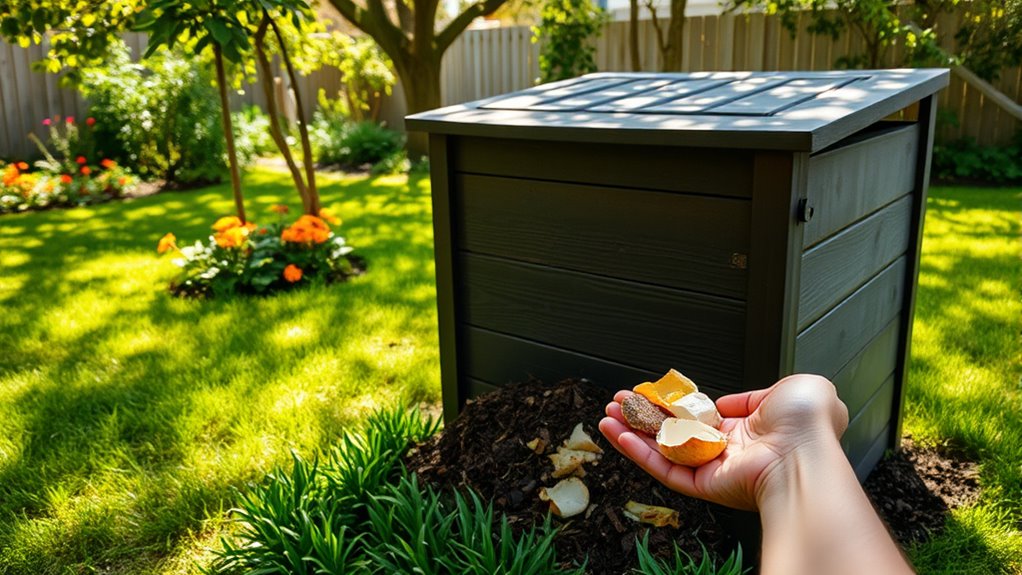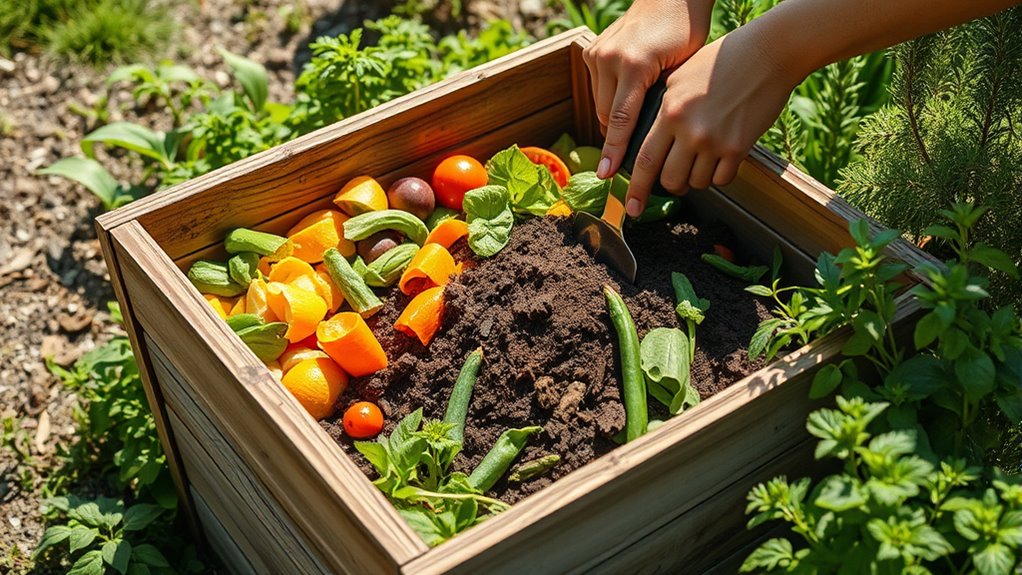Composting at home helps reduce waste, cut down on landfill contributions, and create nutrient-rich soil for your garden. By layering green and brown materials like vegetable scraps and dry leaves, keeping the pile moist, and turning it regularly, you can make compost efficiently. Avoid adding meat or dairy to prevent pests. This simple process supports environmental sustainability while boosting plant health. Keep exploring to discover how to set up and maintain your compost system effectively.
Key Takeaways
- Composting reduces waste, supports environmental sustainability, and creates nutrient-rich soil for healthier plants.
- Choose a convenient, well-drained location with sunlight and shade for your compost setup.
- Layer green and brown materials properly, maintaining the right moisture and aeration for effective decomposition.
- Turn and aerate the compost weekly to speed up composting and prevent odors.
- Avoid adding meats, dairy, or diseased plants to ensure safe, odor-free composting results.

Composting at home is an easy and effective way to reduce waste and create nutrient-rich soil for your garden. When you compost, you’re turning everyday food scraps and yard waste into valuable organic matter, which can improve the health of your plants and reduce your reliance on chemical fertilizers. It’s a simple process that benefits both your garden and the environment, and once you get started, you’ll find it becomes a natural part of your routine.
To begin composting, you need a designated space or container where your compost will break down. You can use a simple bin, a tumbler, or even build a compost pile directly in your yard. The key is to choose a location that’s convenient, well-drained, and gets a good mix of sunlight and shade.
Inside your compost, you’ll want to layer green materials—such as fruit and vegetable scraps, coffee grounds, and grass clippings—with brown materials like dried leaves, straw, or shredded paper. This balance is essential because it provides the right environment for microbes to thrive and efficiently break down the materials.
Next, consider the moisture level of your compost. It should be damp but not soaked, similar to a wrung-out sponge. If it’s too dry, decomposition slows down; if it’s too wet, it can become smelly and anaerobic. Turning your compost regularly—about once a week—helps aerate it, providing oxygen to the microbes that do most of the work.
This process accelerates decomposition and prevents foul odors. You can turn the pile with a garden fork, or if you’re using a bin, simply rotate or shake it to mix the contents.
Another important aspect is maintaining the right carbon-to-nitrogen ratio. Green materials are high in nitrogen, while brown materials supply carbon. Striking a good balance ensures rapid and healthy composting. Proper aeration is also crucial, as it keeps the microbes active and maintains optimal conditions for decomposition.
Avoid adding meat, dairy, or oily foods, as these can attract pests and cause odors. Also, steer clear of diseased plants or weeds with seeds to prevent spreading problems in your garden.
Within a few months, your compost will transform into dark, crumbly soil that smells earthy. This rich humus can be directly incorporated into garden beds, pots, or lawns to boost fertility and improve soil structure.
Frequently Asked Questions
Can I Compost Meat and Dairy Products at Home?
You might wonder if you can compost meat and dairy at home. While technically possible, it’s not recommended because these items can attract pests and cause odors.
If you choose to compost them, do so carefully in a well-maintained, hot compost pile or use a specialized bin.
Keep in mind, adding too much meat and dairy can disrupt your compost balance and create unpleasant smells.
How Long Does It Take for Compost to Be Ready?
You might wonder how long it takes for compost to be ready. Typically, compost reaches maturity in about 3 to 6 months if you turn it regularly and keep it moist.
Factors like temperature, materials, and management can speed up or slow down the process. Stay patient, and you’ll have rich, dark compost ready to improve your garden, providing nutrients and reducing waste efficiently.
What Are Common Pests Attracted to Compost Bins?
Like moths to a flame, pests are often drawn to compost bins. Common visitors include fruit flies, ants, and rodents, attracted by the smell of rotting food and organic matter.
To keep them away, you should cover food scraps, turn your compost regularly, and avoid adding meat or dairy.
Proper maintenance helps guarantee your compost remains pest-free, turning waste into nutrient-rich soil without unwanted visitors.
Is It Necessary to Turn the Compost Regularly?
You might wonder if turning your compost regularly is necessary. Yes, it helps aerate the pile, providing oxygen that speeds up decomposition.
When you turn it, you prevent odors and discourage pests. It also guarantees all materials break down evenly.
Aim to turn your compost every few weeks, especially if it’s not breaking down quickly. Regular turning keeps your compost healthy, odor-free, and ready to use sooner.
Can I Compost in Small Apartments or Limited Spaces?
You can definitely compost in small apartments or limited spaces. Use a compact bin or a tumbler that fits on your balcony, kitchen, or closet. Keep it in a well-ventilated area and turn it occasionally to aerate.
You don’t need a big yard—just a small container and the right materials, like fruit and veggie scraps, coffee grounds, and shredded paper. It’s a simple way to reduce waste and create compost indoors.
Conclusion
By composting at home, you reduce waste, nourish your garden, and protect the environment. You turn scraps into soil, effort into reward, and habits into change. Composting empowers you to make a difference, to embrace sustainability, and to create a healthier planet. So start today, learn more, and enjoy the benefits of composting. Because every small step counts, every mindful choice matters, and every effort contributes to a greener, cleaner future.









